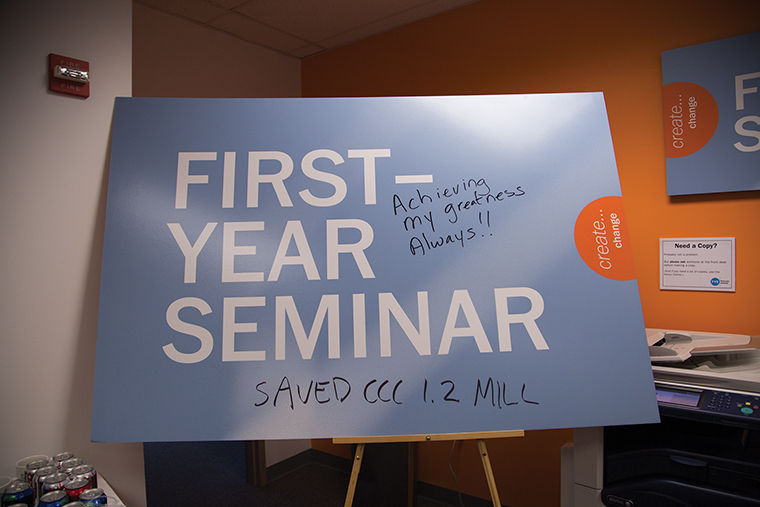Faculty eulogize 10 years of First-Year Seminar
Instead of canceling their end-of-the-year meeting in light of the program’s termination, the FYS Teaching Academy met April 28 to celebrate the work that faculty has done over the last 10 years.
May 4, 2015
First-Year Seminar’s 10-year run ended on a high note during its final meeting on April 28 despite the program’s sudden elimination and termination of its seven employees.
The meeting was originally scheduled as the FYS Teaching Academy—a seminar for the lecturers and adjunct professors who taught the class—to discuss the upcoming academic year but was retooled as a celebration of FYS after news of the program’s elimination, according to Michael Lawrence, FYS interim director.
“This meeting had been scheduled all along as a meeting for discussing what the program would look like next year,” Lawrence said. “Obviously the program isn’t going to be around next year in its current form, so we kept the meeting on the books as a chance to check in about where we’ve been and enjoy the last chance that we’re all getting together as faculty that have worked together for a long time.”
The announcement of the program’s elimination came after the college’s academic hiring period reached a close, making it difficult for those terminated to find work at Columbia or other institutions for the next academic year, as reported April 20 by The Chronicle.
Kristine Brailey, a senior lecturer in FYS, said the meeting was an opportunity to reflect on memories with her colleagues.
“We’ve all done excellent work,” Brailey said. “When you work with a group of people [for] that long, you put a lot into it and all of us put a lot into [the program]. We were abruptly stopped, so we wanted to go out with our heads high.”
Brailey has been teaching FYS for eight years and said it has been a positive experience.
“Some of the high points obviously are our work with the students,” Brailey said. “Students have emailed saying how much they appreciated the class, how much I touched their lives and classroom moments [they valued]. Also, [through] working with a great group of full-time and part-time people, I’ve learned so much. The low point was what the administration did [by terminating the program].”
As a temporary, experimental replacement to FYS, the college is proposing 14 large sections of classes called “Big Chicago” courses, which will be “evaluated through student feedback and faculty review” and serve as the required first-semester course for each major while a committee of both full-time and part-time faculty decide what the college’s next step will be, according to an emailed statement from Suzanne Blum Malley, interim dean of Liberal Arts and Sciences.
Arvis Averette, an adjunct professor in the Humanities, History & Social Sciences Department who also taught FYS, said he taught the class since its creation in the Fall 2005 Semester and will miss working with incoming freshmen as well as his FYS colleagues.
“This is the best group at the school I work with,” Averette said. “I really admire their abilities, so I thought it was good that we get together.”
FYS was a positive teaching experience because it was an interdisciplinary medium that enabled faculty members from multiple departments to work together, Averette said.
“[This experience is different than my other classes] because we go across the whole campus and so we learn from each other,” Averette said. “Dealing with these different professors helps [to] have that cross-pollination. It made me a better teacher.”
In addition to faculty working with people from other departments, Brailey said the class was also a rare chance for students to meet and form relationships with students from other majors and that she is sad to see the program being dissolved.
“Despite a lot of things that have been said, I know all of us have done exceptional work and a lot of us have touched students’ lives,” Brailey said.
Lawrence said turning the meeting into a celebration was important to commemorate the professors’ time spent together and honor the faculty and staff members leaving the college due to the program’s elimination.
“It’s an important time to mark the work that we’ve done, the important role that we’ve served in each other’s lives and professional lives and the good that we’ve done—that we hope we’ve done—for students,” Lawrence said. “It’s an important thing to mark as we wind the program down.”








